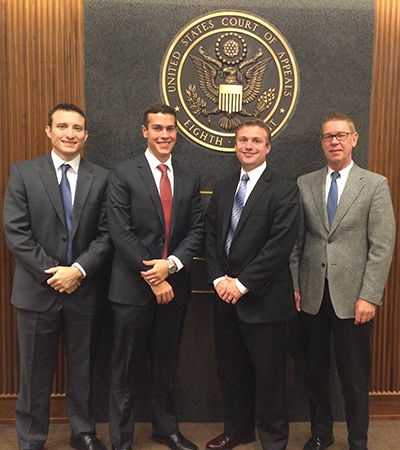09 Oct 2014

Their argument can be downloaded on the Eighth Circuit Court of Appeals website.
Update (via Bloomberg):
A divided U.S. Court of Appeals for the Eighth Circuit drew a road map to show creditors of consumer bankrupts how to avoid preference judgments (Pierce v. Collection Assocs. (In re Pierce), 8th Cir., No. 14-1365, 3/9/15). The case before the St. Louis-based court involved a creditor with a judgment who garnished a man's wages. In the preference period, the employer sent about $850 in garnished wages to the state court. The court had sent about $550 to the judgment creditor before bankruptcy. When the bankrupt notified the court that he had filed for bankruptcy, the court sent some $300 back to him. The bankrupt sued for a preference, seeking to “avoid” the entire $850 garnishment. The complaint only sought return of $550. Citing Section 547(c)(8) of the Bankruptcy Code, the bankruptcy court dismissed the suit. That section of the law provides a defense in a suit regarding a consumer bankrupt barring a preference judgment when the transfer is less than $600. The decision was upheld by the Bankruptcy Appellate Panel. In a 2-1 decision, the Eighth Circuit reached the same conclusion.
Writing for the majority, U.S. Circuit Judge Bobby E. Shepherd upheld the dismissal. Although he acknowledged that garnished wages are transferred to the creditor “when earned,” the judge said he couldn't overlook the fact that the suit only sought return of $550. U.S. Circuit Judge Steven M. Colloton dissented. He said Nebraska law provides that wages are earned when services are performed, not when paid. The creditor gained ownership of the wages when earned, he said. Colloton focused on how the complaint sought to avoid the entire $850. He said the complaint “merely reflects the fact” that $300 was already returned. The bankrupt was represented in the circuit court by the Clinical Law Program at the University of Nebraska College of Law. Professor Kevin Ruser, who was the supervising faculty on the brief, said in a phone interview that they are “evaluating” whether to request rehearing before all active judges on the Eighth Circuit. Where courts follow the Eighth Circuit majority, a creditor of a consumer bankrupt could return enough money after bankruptcy to reduce the net to less than $600, thereby avoiding a preference judgment for what it kept.